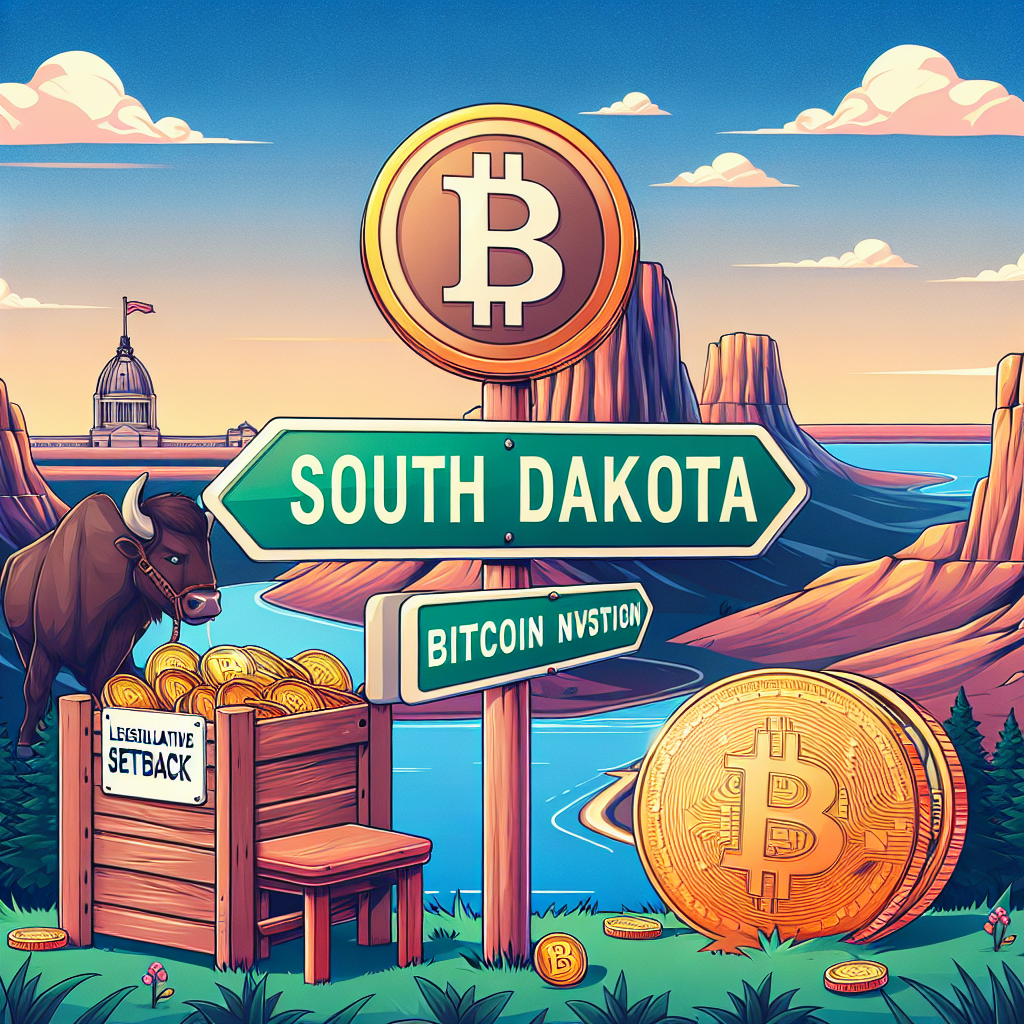Bitcoin
South Dakota’s Bitcoin Reserve Bill Blocked: Legislative Setback for Cryptocurrency Investment

A proposed bill in South Dakota, aiming to utilize state funds for bitcoin investments, has been effectively shut down. Named House Bill 1202 and backed by Representative Logan Manhart, this initiative sought to create a state Bitcoin reserve, allowing South Dakota to allocate up to 10.5% of its total investment portfolio into Bitcoin. This target was intended to position South Dakota as a forward-thinking pioneer in the realm of state-held digital assets.
The bill’s journey came to a halt when the House Commerce and Energy Committee opted not to advance it any further during this legislative session. Instead, the proposal was referred back without progression, terminating its path for this year.
Despite the innovative nature of the legislation, concerns over regulatory issues, market instability, and the potential risks associated with public funds being directed into cryptocurrency contributed to its rejection. The committee’s refusal to move the bill forward came after a 40-day deliberation period, culminating in a vote that reflected apprehension among lawmakers regarding digital asset investments.
Representative Logan Manhart remains determined and is considering reintroducing the bill in 2026. Stakeholders who followed the proposal’s discussions noted that objections stemmed predominantly from worries about the volatile nature of Bitcoin and the lack of coherent federal regulations regarding cryptocurrencies. Critics cautioned that allowing taxpayer funds to be invested in an asset known for its extreme price fluctuations posed significant financial risks.
Lawmakers echoed these sentiments, highlighting that the unpredictable nature of Bitcoin prices raises legitimate concerns. Furthermore, the ambiguous regulatory environment both in South Dakota and at the federal level played a crucial role in the committee’s decision to defer the proposal. With the legal framework for Bitcoin reserves still maturing, representatives voiced their reservations about proceeding without clearer guidelines.
While South Dakota’s initiative may have faltered, states across the country are still exploring the notion of Bitcoin reserve proposals. Interest remains robust, with various states including Florida, Missouri, and Arizona independently seeking to integrate digital currencies into their public investment practices. This ongoing interest signals a trend toward broader acceptance and consideration of cryptocurrency as a legitimate asset class.
In parallel with state-level discussions, institutional adoption of Bitcoin continues to intensify. Companies like MicroStrategy, which has rebranded as Strategy, recently made headlines for amassing a staggering amount of Bitcoin. The firm nearly hit the 500,000 btc mark following a recent purchase valued at approximately $2.1 billion. This development underscores the growing institutional recognition of Bitcoin and its strategic potential.
The failure of HB 1202 reflects caution in the face of historical volatility. Bitcoin’s current valuation stands at approximately $91,123 – a decline of around 4% within a 24-hour period. The total market capitalization of cryptocurrency is estimated at $1.82 trillion, with the daily trading volume soaring to around $48.24 billion, reflecting a notable increase in trading activity.
On the other hand, while the legislative efforts in South Dakota may have been stymied, the ongoing discourse surrounding the potential benefits of state-held Bitcoin reserves suggests that this topic will remain relevant in future legislative sessions. As states continue to navigate the evolving landscape of blockchain and cryptocurrency, the South Dakota scenario may set a precedent worth examining for other jurisdictions contemplating similar initiatives.
As institutional players and states cautiously engage with Bitcoin, the looming question remains: will further adaptations in regulatory frameworks prompt a wider acceptance of cryptocurrencies within public funds? The answer to that question could shape the future of digital assets in government finance, as well as influence how public policy makers view the role of blockchain technology in the economy.
The legislative rejection marks a significant moment in South Dakota’s political landscape, reflecting a broader, ongoing tension between innovation in financial tech and traditional regulatory practices. As lawmakers proceed to evaluate similar proposals in other sessions, the outcome will undoubtedly affect how states manage and incorporate emerging technologies into public investment strategies moving forward.
-

 Press Releases1 year ago
Press Releases1 year agoGaming Technologies of the New Time!
-

 Altcoins10 months ago
Altcoins10 months agoBitcoin Declines Below $80K: deVere CEO Nigel Green Remains Bullish on Long-Term Outlook Following Strategic U.S. Bitcoin Reserve Announcement
-

 Bitcoin1 year ago
Bitcoin1 year agoBitcoin Surges Past $64K as SEI and POPCAT Lead Daily Crypto Gains on September 25
-

 Altcoins10 months ago
Altcoins10 months agoCalls for Enhanced Discussion on Bitcoin as Brazil’s Reserve Asset: A Move Towards ‘Internet’s Gold’
-

 Press Releases2 years ago
Press Releases2 years agoEvo Exchange: Redefining the Decentralized Exchange Landscape
-

 Bitcoin6 months ago
Bitcoin6 months agoGrayscale Investments Submits Draft Registration for IPO, Aiming for Public Trading in U.S.
-

 Press Releases1 year ago
Press Releases1 year agoCODE, a Newly Born Project Brings Decentralization Back to the Main Menu
-

 Bitcoin6 months ago
Bitcoin6 months agoPeter Schiff Critiques New Crypto Legislation, Claims Bitcoin (BTC) Gains are Short-Lived




